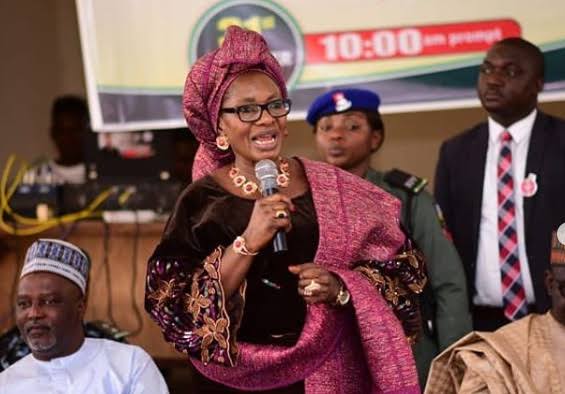Maureen Okpe
The minister of women affairs, Dame Pauline Tallen, has declared that in the forth coming election, Nigerian women will only support political aspirants that have supported the gender inclusion agenda in their various capacity,stating that 2023 election is a time for stock taking.
Tallen stated this on Friday at a media briefing on the status of women inclusion and participation in government at all level, stressing, the success of the Gender Policy Framework depends on the high level of support from government.
She said, “I will like to state on behalf of Nigerian Women that we will no longer support or vote blindly in the coming 2023 general elections. Let it be on record that only Political Parties that fill in at least 35% women representation in both elective and appointive positions and provide for women in their party structures and manifestoes will be supported.
“Women’s participation is central and crucial to our national growth and development. Now is the time for women to take the bull by the horn.The highest political level of governance must embrace gender equality principles and practice for any meaningful change to occur. Even at the global level gender has been adopted as a yardstick for measuring progress in development of the society.
“Over the years, there has been a sustained poor representation and gender imbalance of women in critical areas, when measured against certain standards, such as the number of women who vote in elections; the number of appointive and elective positions held by women.
“Despite the advantage of their numerical strength of 49.2 per cent of Nigeria’s 2016 estimated population of 193 million people and the difference they make in ushering in a new government, they are still largely absent from national and local decision-making bodies; they struggle to have a voice in issues and concerns affecting them.
Tallen noted that over time,equitable participation of Women in Public Life and Leadership space in Nigeria has consistently dominated public discourse due to the key role they play in the political process,adding,despite their huge number political representation is nothing to write home about.
“For instance, currently in the House of Representatives, out of 360 Members, only 18 are women representing about 4.61%; Senate has 8 women out of 109 members representing 7.34%. The same trend, even worse runs down all levels of governance in the States and Local Government Areas.
“According to the World Economic Forum’s Global Gender Gap Report ranking on Women Political participation, Nigeria is worse off in 2019 (102nd) than nine years ago when it ranked 99th worldwide. This is a growing concern to many and in particular Nigerian women.
“Available data from 12 out of 36 States is a clear demonstration of the injustice perpetuated in the election and appointment of women. It is evident that women have been short changed. Out of 36 states of the Federation there are no female Governors, only 2 Female Deputy Governors.
“Statistics from the 12 States show that we do not have a Female Secretary to Government; of 287 State Assembly members in 12 states only 23 are women; of 2,050 Special Assistants only 425 are females; of 325 Local Government Chairmen only 31 are females, 73 Vice Chairmen and 368 females out of 2,075 Councillors of LGAs. This cannot continue.
“The inadequate number of women in decision-making positions is one explanation for the country’s low investment and slow progress in some of the crucial sectors of human development outcomes, such as Security and Peace Processes, Health, Education, ICT development, Finance, Trade and Investments, amongst others.
She therefore stressed that, the year 2022 as an electioneering year provides yet another opportunity to score a point in the quest for women’s political participation that will strengthen accountability mechanisms for voices of women and responsiveness to women’s needs as well as those of men.
“I call for Implementation of affirmative action in all political spheres by all 50% of political posts be reserved for women. Mainstreaming of gender into party politics at all levels – federal, state, and LGAs is key.
“Nigerian women say enough is enough, we must change the narratives. We can no longer fold our arms and be used to canvass for votes. Going forward, we must sign a pact with prospective candidates. It is no longer business as usual. The Nigerian Society boast of well educated women in all fields of human endeavour. They are assertive, beautiful, benevolent, creative, disciplined, diligent, dependable, dynamic, hardworking, innovative, reliable, resourceful and skilful,” she said.

